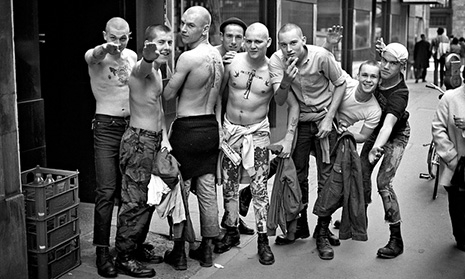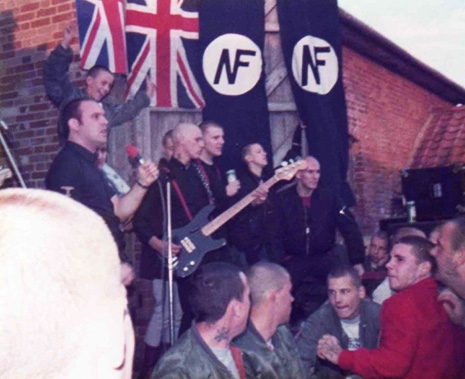
Today’s post is about the new book The White Nationalist Skinhead Movement: UK & USA, 1979 - 1993 released last month by Feral House publishing.

It should be noted that the use here of the term “Nazi Skinhead” is my own broad-brushstroke, informed by being at numerous ‘80s punk shows ruined by “White Nationalist Skinheads”—sometimes at the wrong end of a Doc Marten. This is not a term used by the authors of The White Nationalist Skinhead Movement to describe their subject. Having just admitted my own bias on the topic of “Nazi Skinheads,” let me add that as a student of the history of youth subcultures and countercultures, I am endlessly fascinated, as a topic of study, by the Skinhead movement and its extreme right-wing offshoots.
When I first heard that Feral House was publishing the definitive guide to Nazi Skinhead history, my curiosity was piqued because I was fairly certain they would get it right. Feral House’s Lords of Chaos: The Bloody Rise of the Satanic Metal is the go-to reference on the Satanic fascist Black Metal scene and is an absolutely compelling read. I was hoping for a similarly riveting examination of the White Power Skinhead scene.
Before going into where the book succeeds and fails, I feel the need to point out that the title, The White Nationalist Skinhead Movement: UK & USA, 1979 - 1993, may be a bit misleading. The book is more specifically a history of the “Rock Against Communism” (or RAC) music scene than an overview of Nationalist Skinheads as a political counterculture. Indeed, the original (more appropriate) title of an earlier self-published version of the book was When the Storm Breaks: Rock Against Communism 1979-1993.
It should also be noted that the majority of the enormous 610 page book is devoted to the British RAC scene. Only about 60 pages at the end of the book discuss the American RAC bands, and seems to be an added afterthought compared to the extremely well-researched history of the UK bands such as Skrewdriver, and Brutal Attack and their ilk. Actually “well-researched” is kind of an understatement. And that leads me to the pros and cons of The White Nationalist Skinhead Movement —which are mostly one in the same.
When an author goes about compiling information for the definitive history of a subject—particularly a subject they may have an affinity for—they are forced to decide between paring that knowledge down to a narrative which would make for a fascinating read to the novice, or sharing every shred for the like-minded obsessive seeking an authoritative reference. Authors Robert Forbes & Eddie Stampton took the latter route here. The wealth of information culled from interviews and historical records (mostly fanzines, naturally), would be a boon to those already immersed in the White Power music culture—not simply your basic Nazi Skinhead, but your Nazi Skinhead music über-nerd. If you are a member of this small target-audience, then you will likely find no fault with this weighty tome. If you happen to be taking all of this in as someone with a passing interest in the history of the Oi! music scene and its racist offshoots, then you are likely to become bored with plowing through the minutae of every RAC gig and band-member change. Because it’s ALL in there. I’ll be honest, this book was a struggle for me to make it through—simply because it was just TOO MUCH. Sure, it’s fascinating to see how the popularity of a group like Skrewdriver unfolded from their beginnings as an “apolitical” punk band, through line-up changes, to finally finding a rabid audience among White Power Nationalists; but entire portions of interviews with scenesters are reprinted describing “what it was like the first time I saw Skrewdriver,” when one or two pull quotes would have sufficed. The whole premise is bogged down under the weight of trying to include EVERYTHING.

The authors seem close to their subject matter. One of them perhaps too close for comfort, if you are the sort of person who is a stickler about giving your money to those who hold opposing ideologies to your own. According to this review of When the Storm Breaks, “Eddie Stampton is involved with the Nationalist movement, Robert Forbes writes from a neutral position, intrigued by the subject but not involved in the dogma.”
The end of the book contains the following disclaimer:
The political views expressed in this book may or may not necessarily be those of the authors. No hatred is aimed at any people or races mentioned within, however, for realism when relating to certain events or situations, the authors feel some quotes from others will need be entered into the text to make the mood or feelings of those at said events or situations as true as possible. The authors must stress their own aversion to any acts of hatred or violence towards others. This book is a historical commentary, nothing more and nothing less.
At the same time, the front of the book contains a “Rest in Peace” dedication to notable Nazi Skinheads, including Clive Sharp of No Remorse, Ian Stuart of Skrewdriver, and Nicky Crane (famously violent Skinhead who later came “out” as homosexual). Some may be bothered by the inclusion of such a dedication, while others will overlook it in the interest of having an authentic insight.
Continues after the jump…









